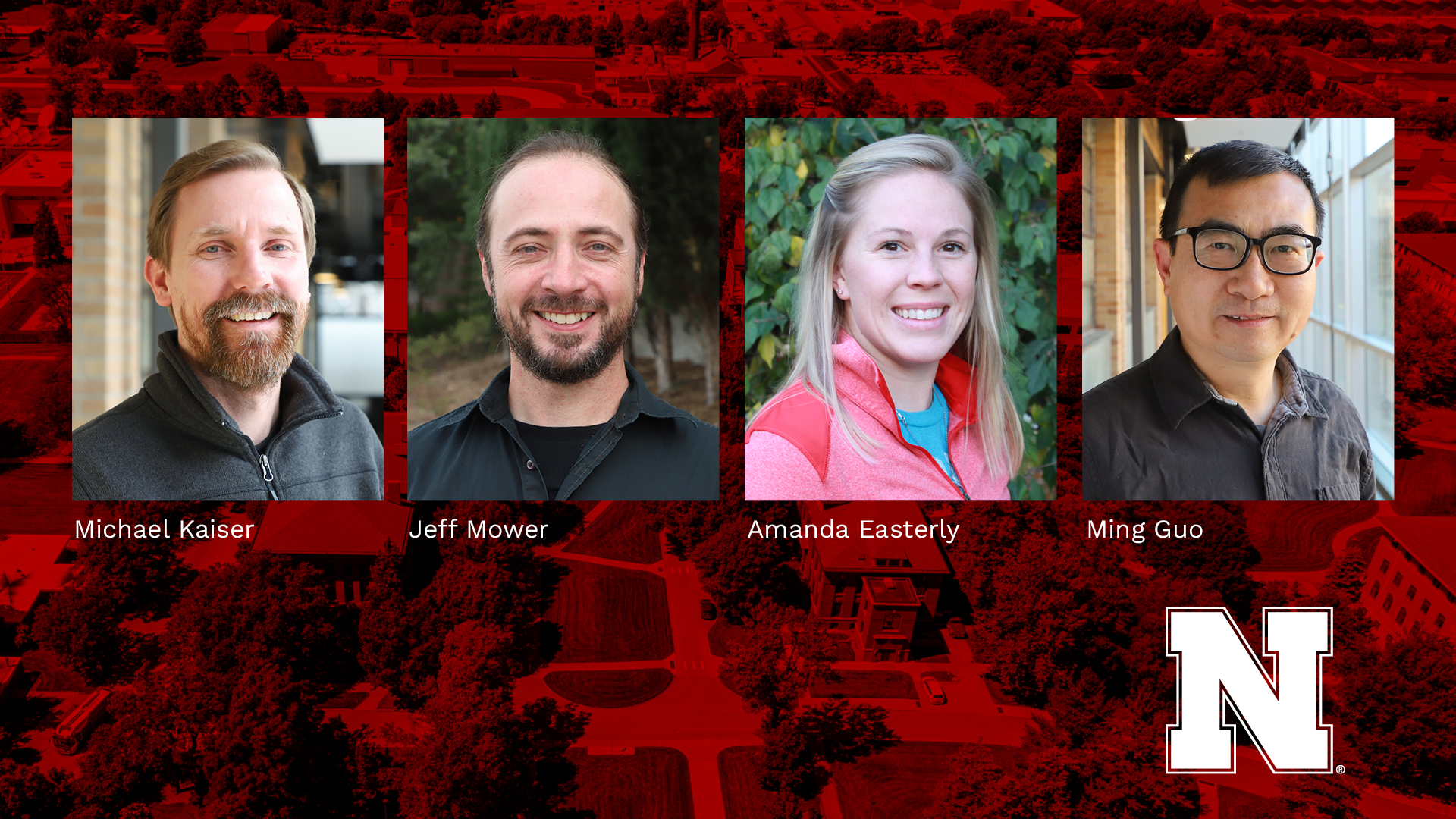
by Fran tenBensel Benne | Agronomy and Horticulture
Four Department of Agronomy and Horticulture faculty received promotion and/or tenure in 2024. They are among the 100 University of Nebraska–Lincoln faculty to be honored this year.
Michael Kaiser was promoted to associate professor and granted tenure. He received a geoecology diploma and a natural sciences doctorate from the University of Potsdam, Germany. He also completed habilitation, a qualification to conduct self-contained university teaching, in soil chemistry from the University of Kassel, Germany. Habilitation is the highest academic qualification attained through examinations in Germany and other European countries and qualifies one to conduct self-contained university teaching. Kaiser joined the department faculty as an assistant professor in applied soil chemistry in 2018.
At Nebraska, Kaiser has a primary teaching appointment and instructs Soil Resources, Urban Soil Properties and Management, Soil Chemistry and Mineralogy, and Soil Carbon and Nitrogen Dynamics.
In his research, he focuses on the impact of land use and biochar and regenerative agricultural practices such as cover cropping and no-till on carbon and nutrient retention in soil. In collaboration with the City of Lincoln and Nebraska Forest Service, among other stakeholders, Kaiser leads a biochar project that includes a 16-acre field experiment of which eight acres were applied with biochar, representing the largest biochar field trial in Nebraska and among the largest in the United States.
Jeff Mower was promoted to professor. He received a Bachelor of Science in molecular biology from the University of Texas at Austin. He earned a Master of Science in bioinformatics and a doctorate in molecular, cell, and developmental biology from Indiana University Bloomington. Mower joined the department faculty as an assistant professor in plant comparative genomics in 2008. He was promoted to associate professor and granted tenure in 2014.
The Mower Lab examines the evolution of genomic structure, function and content of plant mitochondrial, plastid and nuclear genomes. Researchers in the lab address comparative and molecular evolutionary genomics questions using a combination of experimental and computational approaches. The lab takes a comparative genomics approach involving diverse organisms, including flowering plants (crops, wildflowers, parasitic plants), other vascular plants (ferns, gymnosperms, lycophytes) and green and red algae. Topics of study include the evolution of gene function, convergent evolution of morphological and genetic traits, structural and functional genome dynamics and intron evolution.
Mower contributes to the graduate curriculum by teaching Plant Molecular Biology every spring. He has mentored a research professor, five postdoctoral scientists, seven graduate students, more than 30 undergraduate students and three high school students in his lab at Nebraska.
Amanda Easterly was promoted to research associate professor. Easterly received a Bachelor of Science in plant biology from the University of Nebraska–Lincoln and a Master of Science in agronomy from Purdue University. She earned a doctorate in agronomy in plant breeding and genetics from Nebraska. Easterly joined the department faculty as a research assistant professor at the High Plains Ag Lab in 2019 after serving for a year as a research lab manager at the High Plains Ag Lab.
Most of Easterly’s time is spent coordinating research projects at the ag lab and around the state. She is a member of the Dryland Cropping Systems Program, led by Cody Creech, an associate professor, and the Crop Performance Testing Program. Current research focuses on the needs of producers who farm in the semi-arid Nebraska Panhandle and surrounding regions, including selecting cultivars, management practices, and abiotic and biotic stresses that limit productivity. Easterly’s role involves collaboration with colleagues at the University of Nebraska–Lincoln and neighboring institutions.
In 2019, the ag lab began overseeing the program previously referred to as the state variety trials. The program involves testing various hybrids and wheat, corn, grain sorghum and spring wheat varieties. The results are shared with growers, giving them comparative yield data to make informed decisions. She has the opportunity to mentor students and visiting scholars who help and learn at the High Plains Ag Lab.
Ming Guo was promoted to research associate professor. Guo received a Bachelor of Science from the Jiangxi Agricultural University, China. He earned a Master of Science and a doctorate from Northwest A&F University, China. Guo joined the department faculty as a research assistant professor at the Beadle Center in 2019.
Guo has been a key member in supporting the Plant Transformation Core Facility of the Agricultural Research Division, a major research agency of the University of Nebraska’s Institute of Agriculture and Natural Resources and Nebraska’s Agricultural Experiment Station. His research involves developing transgenic and genome-edited crops, including soybean and sorghum, to improve the nutritional values (protein and oil), yield and abiotic and biotic resistance. Additionally, he researches plant-pathogen interaction, revealing bacterial effectors’ virulence activities. A recently highlighted work is the discovery that bacterial pathogens use a novel effector-catalyzed signaling molecule to counter plant immune systems.
More details at: https://go.unl.edu/mutv